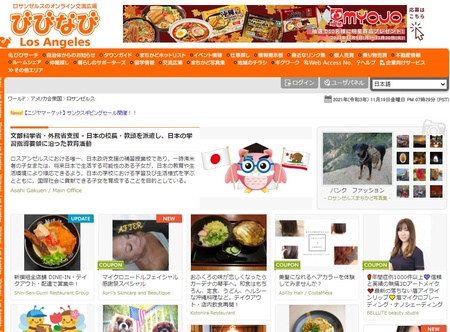Participatory media
So far, this series has interviewed editors of print media such as newspapers and magazines published all over the United States. However, in today's Internet society, in addition to print media, we should also focus on "Japanese media" that operate only online. "Discover Nikkei," where I am writing this article, is itself an online media. The advantages of online media are that they can be viewed from anywhere in the world, that corrections can be made immediately when necessary, and that those viewing the information can also communicate two-way by writing in the comments section. Taking advantage of these characteristics, "Vibinavi" has expanded to 33 areas across the United States, starting with the Los Angeles version launched in May 2000, with the catchphrase "Online Communication Square in Your City." It can be said to be an outstanding presence as a Japanese online media.
I myself have used Vibinavi many times. I have placed recruitment ads in the "Job Search" section, and I have also posted notices for yard sales on the "Information Bulletin Board." Although I don't post anything myself, I sometimes check out the "Exchange Plaza" to see chats to find out what Japanese people in the U.S. are currently interested in, and I sometimes check the average rental prices in the "Real Estate Information" section.
About six months ago, I placed an ad in the Texas edition of Vivinavi for a recruitment ad for a Japanese company for which I am in charge of public relations. I filled out the necessary information in the online form, attached the logo, and completed the ad. However, I immediately received a reply saying, "The resolution of the logo was low, so we made some corrections," and I was impressed by their detailed customer support.
The person who responded to our interview this time is Yoko Sudo, the director of Vibinavi. When I asked her if she was the director of the Los Angeles version, she replied, "I can work from anywhere, so I'm in charge of 113 areas around the world, including 33 areas in the US." Indeed, since Vibinavi's users, or people in each area, are the ones who place ads on Vibinavi, it doesn't matter where the operators are located.
Information related to daily life
When I asked Sudo about the background to the establishment of Vibinavi, he introduced the following words of CEO Tamura Yoshikuni: "Vibinavi is a regional community site for Japanese people that was launched in Pasadena, California in 2000. I personally found it inconvenient living in America that while it was easy to access information about new products from major companies, information like 'kittens for sale' or 'rooms available' could only be found on notices posted on bulletin boards in places like supermarkets. We started this site with the idea that it would be great if we could provide this kind of information that is closely related to everyday life more easily via the Internet."
Sudo continued, "We disseminate information that Japanese people living overseas want to spread to their local communities and deliver the necessary information. Bibinavi aims to facilitate communication within the community."
Bibinavi is chock full of information posted by individuals, along with paid advertisements from businesses such as travel agencies, various clinics, and restaurants. The requests are diverse, including "I'm looking for a tax accountant who will give me friendly advice," "I'm very busy, so I'm looking for someone to cook me dinner," and "I'm looking for someone to help me move." "Bibinavi focuses on the exchange of information between individuals. In this regard, anonymity is a matter of mixed reviews. While an increasing number of sites are conducting identity verification, many people hesitate to post questions if they have to write their real name. Since Bibinavi posts anonymously, we monitor the information through our system and also check it with human eyes in order to watch for malicious information."
To Japanese communities around the world
In this way, not only is the content itself made up of information from many users, but the areas in which it is available also reflect the wishes of the users, says Sudo: "We started Vivinavi in Los Angeles and then gradually expanded from the West Coast to all over the US, focusing on areas with large Japanese populations. We also receive many requests from users about areas around the world where they would like us to open new Vivinavi sites. Jacksonville, Florida is one area that has been realized based on user requests."
In this way, Bibinavi has grown into a site that mediates the exchange of information among Japanese communities around the world, covering all areas of the United States, from Los Angeles, San Francisco, Hawaii, and New York, where many Japanese people live, to Jacksonville, where there are not so many, as well as Japan's 47 prefectures, Asia, Europe, Central and South America, Australia, and New Zealand. The total number of monthly visitors to all of these sites is said to be 1.6 million.
This is just my personal impression, but I feel like the usability of "ViViNavi" improved dramatically a few years ago. According to Mr. Sudo, the company has been constantly discussing and considering ways to make it easier for users to participate, and has made the necessary improvements.
The aim of the company's founder, Mr. Tamura, was to "provide a place where people can easily exchange information related to their daily lives over the Internet," and the site has taken shape and spread around the world. This is because users who want to exchange information in Japanese, including Japanese people living in the United States, have welcomed and used the site.
* Vibinavi Los Angeles website
© 2021 Keiko Fukuda







